DUBAI: Education, like charity, begins at home.
The adage couldn’t be truer for Omar Farooqui, a 42-year-old investment banker turned educator, who says he was taught a lesson at home by his 12-year-old son.
He says he turned the tables on his lucrative career and moved to education when he realized how unhappy his son was with the traditional system of schooling and the current present education system which was archaic and irrelevant for the children of today.
It was at that moment that he decided to adopt technological tools to inject some fresh blood into the educational sector. To realize his goals, Farooqui, who is based in Dubai, set up Coded Minds – an educational company that finds its roots in technology-based solutions.
As the founder and chief innovation officer of Coded Minds, he says he began his [global journey] with Pakistan to introduce new teaching methods from the grassroots to the university levels. For the purpose, he is in talks with several leading universities, school representatives, and government authorities to collaborate on several projects in Pakistan.
Speaking to Arab News, Farooqui said that the education system in Pakistan needed a total revamp. “Education in Pakistan is an extremely fragmented sector and one that needs a lot of re-organization. It is very much set in the old British colonial style which in itself is outdated. If you add to that a fragmented mix of American as well as Pakistan’s very own educational standards then you really do have a sector that needs to be re-organized from top to bottom,” Farooqui, a Saudi national said. He added that Pakistan holds a very special place in his heart because of his father who was originally from Pakistan. Azad Kashmir’s Muzaffarabad’s area and mother from Lahore.
Adding that the issue is not specific to Pakistan, but one that impacts the rest of the world too, Farooqui says the traditional education system is outdated globally. “It does not prepare the child for the real world. An over-reliance on theories and yearly examination leads to a system that gears itself only for college or university admissions and not for the actual, every day, practical life,” he said.
Farooqui believes that a technology-based system can help Pakistan attain new age education standards. “In fact, technology encourages cross schools collaborations, too,” he said.
Dr. Jawaid Laghari, former chairperson of the Higher Education Commission (HEC) concurs. Endorsing the fact that technology can play a major role in improving the quality of education and limiting the number of public school dropouts, he said: “Online free access through low-cost bandwidth and low -cost tablets would make a difference. Singapore is a model to emulate.”
Dr. Laghari added that the present public education system — both at the school and college levels — is unsatisfactory. “It is subject to bad management and corruption. We need to give at least one year to the present government if the reforms they would introduce will make a change,” he said.
According to Pakistan’s educational statistics from 2015 to 2016, 21 percent of primary schools in the country is being run by a single teacher while 14 percent have a single room. Additionally, in terms of the schools’ infrastructure, 40 percent of primary schools in the public sector operate without electricity, 28 percent do not have toilets, 25 percent are without boundary walls, while 29 percent have no access to drinking water. Seven percent of schools do not have any building and 43 percent have dilapidated buildings.
Farooqui is aware of these numbers. As he is of the fact that the low literacy rate has always remained a constant in Pakistan – a country which has barely witnessed an improvement or enhanced enrollment in the past couple of years. According to the Economic Survey of 2017-18, “last year, the literacy rate dropped by two percent from 60 to 58 percent. This year it has remained the same with no improvement”.
Farooqui believes that children opt to drop out of school either when the quality of education is unaffordable or of very poor quality. “Technology plays a heavy role in bridging the gap. In fact, it will not only help improve teaching standards but will improve individualized learning too, be it public or the private schools.
Aware of the hurdles that he might have to face along the way, Farooqui says he is all set for the battle.
“Change is the one thing that most human beings are afraid to do. We intend to partner up with local institutions and at the same time gather governmental support so we can take a top-down approach,” he said, adding that even though the education values in Pakistan are different from those of Saudi Arabia and the UAE, the basics are the same.
“It is the culture and traditions that make the difference. Majority of the battle that we face is about creating awareness as well as bringing change,” he said.
He added that the one-of-its-kind private collaboration with Saudi, in Pakistan’s education sector, will go a long way. “Saudi Arabia and Pakistan have always enjoyed long cordial brotherly relations and that will never change due to the strategic nature of both countries,” said Jeddah born educator.
“Saudi Arabia has always had private capital investment into Pakistan through partnerships and now more recently Saudi Arabia has committed to deploying capital as part of the CPEC. I am certainly hoping that through Coded Minds initiative, there will also now be a major inflow of capital into the education system of Pakistan not just through Saudi Arabia but even beyond that.”
“Change is the one thing that most human beings are afraid of”
“Change is the one thing that most human beings are afraid of”
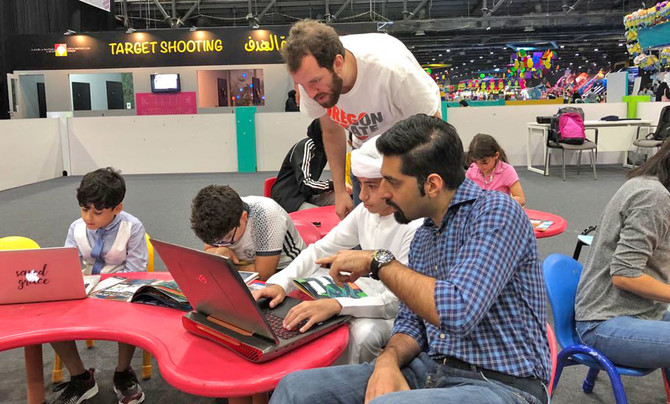
- A Saudi national educator is asking people to fight their fears by encouraging an overhaul in Pakistan’s educational system
- Insists that the existent teaching methods are archaic and do not prepare a child for the real world
Pakistan’s economic conditions improving, reforms and privatization on track — PM
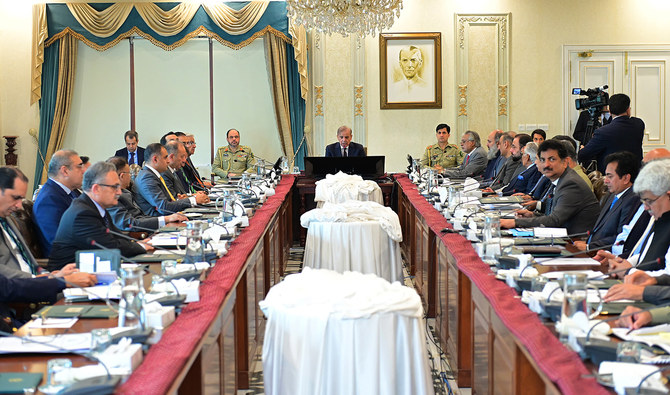
- Sharif says exports and remittances had shown a rise within one-and-a-half month of his government
- Pakistan’s finance ministry expects the economy to grow by 2.6 percent in the current fiscal year ending June
ISLAMABAD: Pakistan’s economic indicators are showing positive signs, with an agenda of painful reforms and privatization on track, Prime Minister Shehbaz Sharif said on Friday, ahead of an IMF board meeting to decide on a $1.1 billion funding for the country.
The prime minister said, in an address to his cabinet that was telecast live, that exports and remittances had shown a rise within one-and-a-half month of his government.
The IMF board is meeting on Monday to decide on the disbursement of the second and last tranche of a $3 billion standby arrangement Islamabad secured last summer to avert a sovereign default.
With a chronic balance of payment crisis, Pakistan needs $24 billion in payments for debt and interest servicing in the next fiscal year starting July 1 — three-time more than its central bank’s foreign currency reserves.
The South Asian nation is seeking yet another long-term, larger IMF loan. Pakistan’s Finance Minister, Muhammad Aurangzeb, has said Islamabad could secure a staff-level agreement on the new program by early July.
If successful, it would be the 24th IMF bailout for Pakistan.
The IMF-led structural reforms require Pakistan to raise its tax to GDP ratio from around 9 percent to at least 13 percent-14 percent, stop losses in state-owned enterprise and manage its energy sector losses which run into trillions of rupees.
“It is not just for an antibiotic to work anymore. It needs a surgery,” Sharif said.
Pakistan’s finance ministry expects the economy to grow by 2.6 percent in the current fiscal year ending June, while average inflation is projected to stand at 24 percent, down from 29.2 percent in fiscal year 2023/2024.
Inflation soared to a record high of 38 percent last May.
Pakistan joins calls by UN for ‘credible investigation’ into mass graves discovery in Gaza
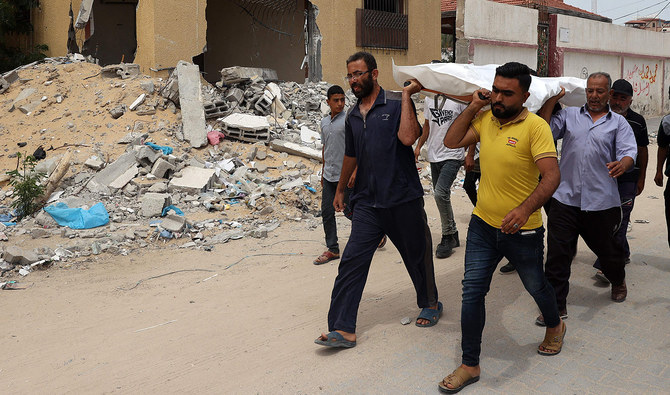
- Palestinian authorities say mass graves at Nasser and Al Shifa hospitals contain hundreds of bodies
- Pakistan says “independent and impartial investigation” must fix responsibility and punish perpetrators
ISLAMABAD: Pakistan said on Friday it joined the United Nations in calling for a “transparent and credible” investigation into the discovery of mass graves at two major hospitals in Gaza where over 34,000 Palestinians have been killed by Israeli attacks since October.
The discovery of the mass graves, said by Palestinian authorities to contain hundreds of bodies, have triggered calls by the UN rights chief and others for an international investigation. While not defined under international law, a mass grave is a burial site containing multiple bodies, the existence of which could be important in detecting possible war crimes.
Palestinian authorities said a grave site discovered at the Nasser hospital, the main medical facility in central Gaza, contained nearly 400 bodies. It was uncovered after Israeli troops pulled out of the city of Khan Younis.
Another grave site was also found by Palestinian authorities at the Al Shifa hospital in northern Gaza, which had been targeted by an Israeli special forces operation.
“Pakistan joins the calls by the United Nations for a clear, transparent and credible investigation of mass graves and the massacre of men, women and children by the Israeli occupation forces,” the foreign office spokesperson said at a weekly briefing in Islamabad.
“An independent and impartial investigation must be held to ascertain the facts, fix responsibility and punish the perpetrators of war crimes and crimes against humanity in Gaza.
“We urge the international community, especially the backers of Israel to take urgent measures to bring an end to the war on the people of Gaza. Lift the siege, protect civilians, facilitate humanitarian assistance and to hold to account the perpetrator of Gaza genocide.”
Currently, the International Criminal Court in The Hague has an active investigation into the attacks on Israel on Oct. 7 by Hamas and the response by the Israeli military.
The office of the prosecutor has jurisdiction in the Palestinian territories, but has not made any public comments about the discovery of mass graves.
Under the 1949 Geneva Conventions, to which Israel is a signatory, parties to a conflict must take all possible measures to prevent the dead from “being despoiled.” Customary international humanitarian law (IHL) calls for the dead to be respected, including a duty to prevent despoiling of graves and ensuring the identification and proper burial of human remains.
IHL also prohibits mutilation, desecration and other forms of disrespect toward the dead, while parties should take measures to protect grave sites, including those containing multiple human remains.
In 2002, in a case related to killings of Palestinians in the Jenin refugee camp in the West Bank, Israel’s Supreme Court ruled that the Israeli Defense Ministry was responsible under international law “for the location, identification, evacuation, and burial of the bodies” of Palestinians killed in fighting. The judges said bodies should not be buried in mass graves but handed over to the Palestinian authorities.
The International Criminal Court’s founding Rome Statute defines the desecration or mutilation of dead bodies as a war crime and this is banned as an outrage upon personal dignity.
Allegations by Palestinian authorities that the Israeli Defense Forces (IDF) had buried the bodies were “baseless and unfounded,” the IDF said in a statement. The graves were dug by Palestinians, it said, releasing footage showing the graves pre-dated IDF operations.
IDF forces searching for Israeli hostages had examined bodies buried near Nasser hospital and then returned them, the IDF said.
“The examination was carried out respectfully while maintaining the dignity of the deceased,” it said.
With inputs from Reuters
China says will continue investments in Pakistan after deadly suicide bombing
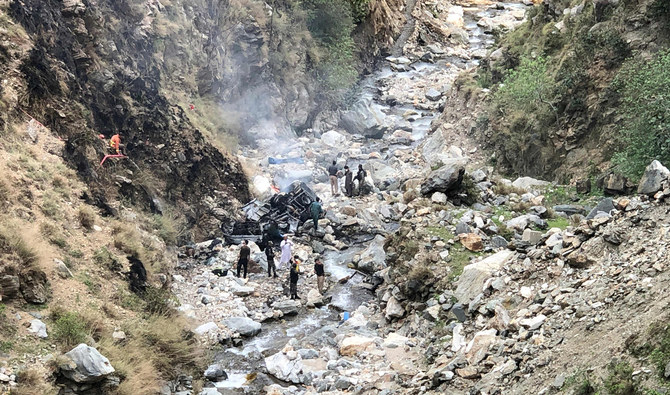
- On Mar. 26, suicide bomber hit a convoy of Chinese engineers working on Dasu hydropower project
- Five Chinese nationals and their Pakistani driver were killed in the attack in northwestern Pakistan
ISLAMABAD: The Chairman of the China International Development Cooperation Agency (CIDCA), Luo Zhaohui, said Beijing will continue to work with Pakistan to fulfill commitments made under the framework of the China-Pakistan Economic Corridor and the Global Development Initiative, Pakistani state news agency APP reported on Friday.
Luo’s statement comes a month after a suicide bomber rammed a vehicle into a convoy of Chinese engineers working on a hydropower project at Dasu in the northwestern Khyber Pakhtunkhwa province, killing five Chinese nationals and their Pakistani driver.
The assault on Mar. 26 was the third major attack in little over a week on China’s interests in the South Asian nation, where Beijing has invested more than $65 billion in infrastructure projects as part of its wider Belt and Road initiative.
Chinese contractors suspended work on three hydropower projects in view of security concerns after the March attack, government officials told media last month.
“China is ready to work with Pakistan to implement the consensus reached by the leaders of the two countries, further, deepen strategic mutual trust, and promote practical cooperation in various fields within the framework of the China-Pakistan Economic Corridor and the Global Development Initiative,” APP quoted Luo as saying.
“In his meetings with friends from various sectors during a recent visit to Pakistan, he hoped that friends from all walks of life would continue to exert their influence, and offer advice and suggestions for the development of bilateral relations.”
During the meetings, according to APP, Lou thanked Pakistani officials for “their long-standing contributions to China-Pakistan friendly cooperation, emphasizing the increasingly significant strategic importance of accelerating comprehensive cooperation between China and Pakistan and leading regional development trends.”
The Pakistani side expressed condolences over the Dasu attack and “highly praised the enduring traditional friendship” between Pakistan and China and their cooperation in various fields.
“They added that Pakistan will continue to support the development of Pakistan-China relations, advance exchanges on state governance, and expand friendly exchanges between the two countries in various sectors, including between governments, parliaments, business communities, think tanks, youth, and civil society,” APP said.
The Mar. 26 bombing followed a Mar. 20 attack on a strategic port used by China in the southwestern province of Balochistan, where Beijing has poured billions of dollars into infrastructure projects, and a Mar. 25 assault on a naval air base, also in the southwest. Both attacks were claimed by the Baloch Liberation Army (BLA), the most prominent of several separatist groups in Balochistan.
Dasu, the site of a major dam, has been attacked in the past, with a bus blast in 2021 killing 13 people, nine Chinese among them, although no group claimed responsibility, like the Mar. 26 bombing.
Pakistan is home to twin insurgencies, one mounted by religiously-motivated militants and the other by ethnic separatists who seek secession, blaming the government’s inequitable division of natural resources in southwestern Balochistan province.
Chinese interests are under attack primarily by ethnic militants seeking to push Beijing out of mineral-rich Balochistan, but that area is far from the site of the Mar. 26 bombing.
Pakistan central bank expected to hold rates on Monday ahead of IMF deal
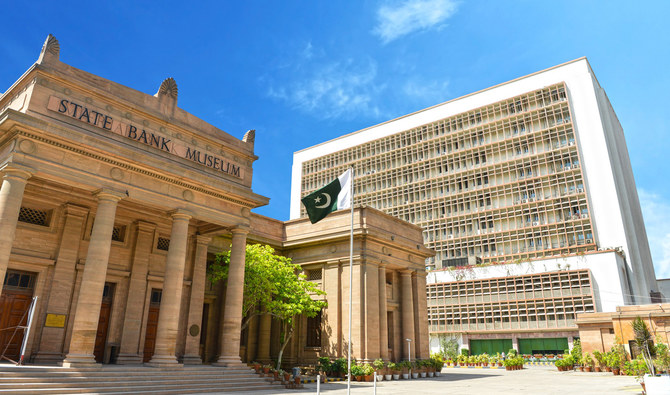
- Median estimate in Reuters poll predicts State Bank will hold rates steady
- South Asian nation is seeking new long-term, larger IMF bailout program
KARACHI: Pakistan’s central bank is widely expected to hold its key interest rate at a record 22 percent for the seventh straight policy meeting on Monday as Pakistan gears up for an International Monetary Fund board approval and talks on a longer term program.
Monday’s policy decision will be followed by the fund’s executive board meeting to discuss the approval of $1.1 billion in funding for Pakistan, which is the last tranche of a $3 billion standby arrangement with the IMF secured last summer to avert a sovereign default.
The median estimate in a Reuters poll of 14 analysts predicts the State Bank of Pakistan (SBP) will hold rates steady.
Four analysts are forecasting a 100-basis-point (bps) cut, while two expect a 50-bps cut on Monday.
Eight respondents expect a rate cut before Pakistan signs a new program with the IMF. There is another MPC meeting on 10 June 2024, which is possibly before Pakistan gets another IMF Programme.
The South Asian nation is seeking a new long-term, larger IMF loan. Pakistan’s Finance Minister, Muhammad Aurangzeb, has said Islamabad will begin talks with the fund next month, and could secure a staff-level agreement on the new program by early July.
Pakistan’s key rate was last raised in June to fight persistent inflationary pressures and to meet one of the conditions set by the IMF for securing the bailout.
Pakistan’s Consumer Price Index (CPI) for March rose 20.7 percent from the year before, slowing down partly due to the “base effect,” touching a record high of 38 percent in May 2023.
Tahir Abbas, head of research at Arif Habib Limited said that the central bank is unlikely to cut rates before getting a new IMF program. “The monetary policy will also consider the inflationary outcome of tensions in the middle east and its impact of fuel prices, along with the Fed’s delay in monetary easing,” he added.
“Expect a symbolic reduction in the current quarter (till June), with aggressive cuts to follow in the September quarter as the government has to roll over approximately 6.7 trillion rupees of maturing domestic treasury bills in the last quarter of the calendar year,” said Mustafa Pasha, CIO of Lakson Investments.
He added that by then there will be greater clarity on inflation and FX inflows. “Historically the SBP has cut rates in the 1st year of an IMF program and we expect the policy rate to settle around 17 percent by December.”
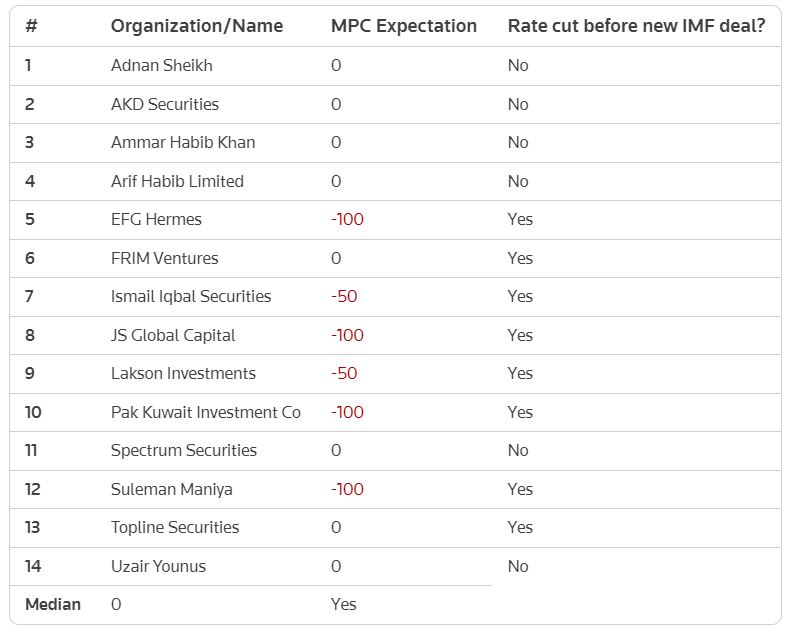
Punjab Police defends chief minister after controversy over wearing police uniform
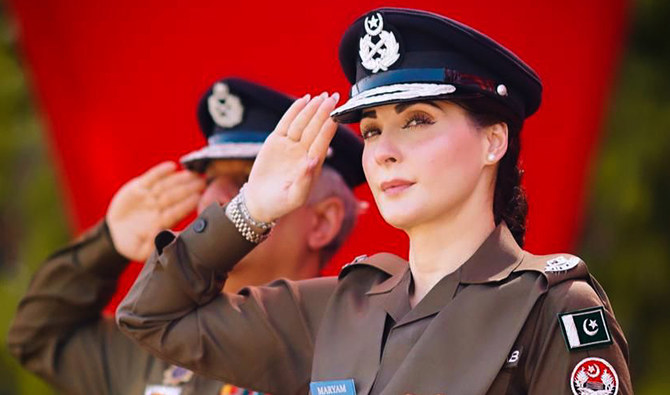
- Sharif donned police uniform to attend passing out parade on Thursday
- Move widely criticized by political opponents and social media users
ISLAMABAD: Police in the Pakistani province of Punjab have said Chief Minister Maryam Nawaz Sharif’s act of wearing a police uniform to a passing out parade this week was a “commendable show of solidarity” after widespread criticism by opposition politicians and social media users.
On Thursday, Sharif, who is the first woman chief minister in Pakistan’s history, wore a police uniform while attending a passing out parade of woman constables and traffic assistants at the Police Training College in Chung.
Opposition leader in the National Assembly, Omar Ayub, and other opposition politicians like Yasmin Rashid, Moonis Elahi and Shahbaz Gill all criticized Nawaz’s decision to don the police uniform. The issue also remained a top trend on social media, with many users questioning the logic behind the move.
But the Punjab Police force came out in the chief minister’s defense in an X post.
“As per the ‘Punjab Police Dress Regulations’, the CM of Punjab, Maryam Nawaz Sharif, is entitled to wear the police uniform,” it said in a statement.
“This has been widely celebrated by the police personnel, who view it as a commendable show of solidarity.”
The statement said the Central Police Office had received hundreds of messages by police personnel who had “lauded” Sharif’s act of wearing the uniform and women police officers in particular were celebrating the gesture.
Punjab police also shared a copy of rules that govern how governors and chief ministers can dress on formal occasions.
As per the amended Punjab Police Dress Regulations, “chief minister may wear uniform on formal occasions like review of parades, while addressing police darbars, visiting police establishments or any such occasion as specified, for encouraging the police personnel and troops.”
Separately, a citizen named Waqar Ali filed a plea at a local court against Sharif, arguing that a civilian cannot wear the uniform of an institution and calling for a case to be registered against the Punjab chief minister.










